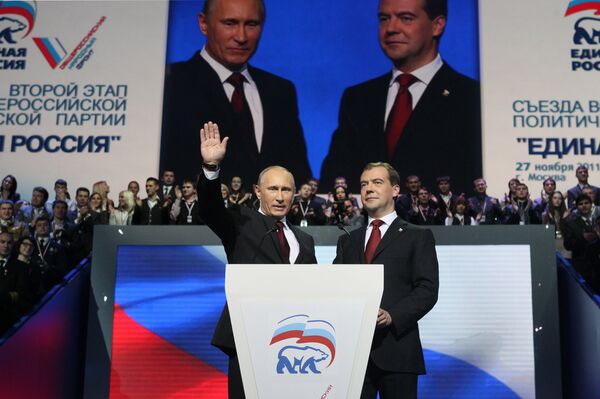The article Prime Minister Vladimir Putin penned for Izvestia is the most striking and substantive document of the ruling tandem since Gazeta.ru carried President Dmitry Medvedev’s article “Russia, onward!” in 2009.
Each article reflects, in its own way, the tandem’s ideology, which, for all its outward contradictions, is consistent at its core. True, the two articles are separated by a historical landmark – the Duma elections of 2011 and the subsequent protests, after which it became clear that explanations were in order.
The prime minister’s old formula that “only enviers and enemies would criticize Russia as it rises from its knees” no longer holds water. The prime minister has decided to offer some explanations, just as Medvedev did in 2009. However, these documents are fundamentally different in some respects.
The differences begin with where the two leaders chose to publish their program articles. In 2009 Medvedev chose Gazeta.ru – a fashionable and relatively new online source of news, opinions and comments reflecting the liberal views of the Russian middle class. Putin chose Izvestia, a newspaper with a storied late Soviet history and a once unimpeachable reputation. However, after a change in ownership, the paper began to speak to the much more conservative segment of the middle class.
The choice of medium reflects a difference in style. Putin’s article, “Russia muscles up – the challenges we must face,” stands out for his thoughtful defense of the economic and political system he helped created. He offers the nation a promise of gradual transition to a more democratic system based on the gradual rise of the middle class, the guarantor of stability and democracy. Putin’s approach to democracy may be called economic. First, we must build a solid “social majority” that favors stability; then that majority will quietly press its demands.
Medvedev’s approach is trendier and more dynamic. It no doubt resonated with the younger generations that the president consciously seeks to engage. In his 2009 article he does not suggest postponing democracy until some vague future but promises current generations that parliamentary parties “will periodically take power from one another.”
“The parties and their coalitions will choose the federal and regional executive authorities (and not vice versa). They will nominate candidates for the presidency, regional governors and local authorities,” he wrote. The reality has proved to be more complicated – formally the role of parties has been increased but they continue to be dependent on the powers that be.
The difference in how Putin and Medvedev define their enemies is also interesting. All policies must have an enemy, otherwise the politician’s words will become insipid – advocacy of all things good is pleasant but not exciting.
The enemies of Putin’s policy are the imminent world crisis and “destructive forces” in the problematic parts of the world, supported by countries trying to “export” democracy by force. Inside Russia, the enemies are irresponsible elites that favor “revolution rather than stable development.”
Medvedev elides the question of outside enemies in his article, preferring not to demonize either the West or the East. As for domestic enemies, he paints a recognizable picture of corrupt officials and useless entrepreneurs.
“They will attempt to interfere with our work. Influential groups of corrupt officials and do-nothing ‘entrepreneurs’ are well ensconced. They have everything and are satisfied. They're going to squeeze profits from the remnants of Soviet industry and squander the natural resources that belong to all of us. They are not creating anything new, do not want development, and fear it. But the future does not belong to them – it belongs to us. And we are the absolute majority.”
But are we a majority? Modernization is not a blessing for everyone at all times. Medvedev himself admitted this at the Yaroslavl forum in 2011, having noted that the current era saw the mass extinction of professions as innovations made once essential occupations obsolete.
Putin elevates this issue to the practical plane. In the next decade we will have to employ 10-11 million young people, including 8-9 million with a higher education. Meanwhile, at least five million are already dissatisfied with their jobs. They are dissatisfied with their salaries, the nature of their work and its prospects.
So, we will have to create 15 million jobs. Add to this number 10 million working in jobs that are archaic and sometimes dangerous for employees and the environment. So, all in all we will need 25 million jobs…
No doubt, Medvedev was much more critical of the domestic situation than Putin is now. This is only natural for reforms seldom emerge from contentment.
Putin is often blamed for not completing his texts and for not having a clear-cut agenda. Well, enlightened conservatism is not supposed to have definite conclusions. This is probably why Putin’s long article seems incomplete and he promises to continue talking to the nation in the future.
By contrast, Medvedev’s article looked complete in the now distant 2009. It received a very positive response in the West and even among the part of the domestic opposition that saw in it a promise of the notorious “level playing field” for all political players.
Alas, in politics no playing field is perfectly even – it is made not by machines but by imperfect humans. Apart from institutions, democracy requires tolerant and educated people that are capable of listening to their opponents.
Incidentally, Putin has also raised this critical human factor He disparages officials for their prejudice against activists and lashes out at the public for its skepticism to benefactors. This is also right. There is no democracy without democrats and democrats cannot be produced even by the most modern factories. They can only be cultivated.
Medvedev’s “Russia, onward!” slogan has become no less relevant since it was first published. It has taken on new meaning as circumstances have changed. Perhaps its message was heard by others.
The views expressed in this article are the author’s and may not necessarily represent those of RIA Novosti.



